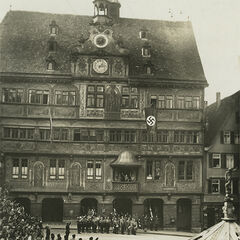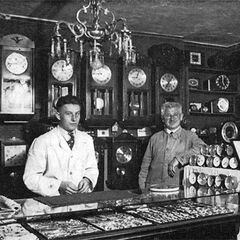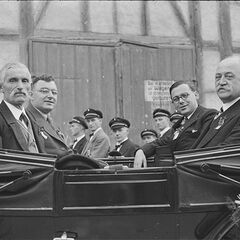City Hall: Destroying the Municipal Democracy
Station im Stadtrundgang: History Path to National Socialism
On March 31, 1933, the democratically elected Tübingen Gemeinderat (town council) had to dissolve. After the Nazis had gained a victory in the (already unfree) Reichstag parliamentary elections a few weeks earlier, they also procured a majority of seats in Tübingen's municipal committees.
The "Gesetz zur Gleichschaltung der Länder mit dem Reich" (literally: "Law for the Coordination of the States with the Reich"; Gleichschaltung is best translated as "forced coordination") of March 31, 1933 dissolved municipal parliaments throughout the Reich. In Tübingen, 27 municipal councilmen and 1 councilwoman lost their mandates. In addition, the Nazis started to take action against different-minded local politicians. Already a few weeks before the municipal council was dissolved, the only Communist councilman, master tailor Hugo Benzinger, was prohibited from exercising his office. Benzinger was able to prevent arrest for some weeks by going into hiding, but in April 1933, he was taken to Heuberg concentration camp in the Swabian Jura. Liberal councilman Simon Hayum, a Jew, forestalled his divestiture by offering his resignation. The municipal council was now majorly made up of councilmen from the Nationalsozialistische Deutsche Arbeiterpartei (National Socialist German Workers' Party, NSDAP). In May 1933 the municipal council decreed that "Jews and Foreign Races" were banned from frequenting public outdoor swimming pools — the first ban of this sort in the German Reich. In summer 1933, all parties in the Reich except the NSDAP were outlawed.
Oberbürgermeister (mayor) Adolf Scheef, in office since 1927 and formerly a liberal, supported National Socialist policies. In 1939, he was succeed by former Tübingen NSDAP party chairman Ernst Weinmann. The local council had been reduced to a mere tool of approval for decisions by Scheef and Weinmann.
Image 1
On March 6, 1933, the National Socialists won the Reichstag parliamentary election. Three days later, they raised the swastika flag on the Tübingen Rathaus (city hall). The "Gleichschaltung" (forced coordination) following the Ermächtigungsgesetz (Enabling Act) secured National Socialist power in government agencies, associations, and Vereine (registered societies). Photo: City Archives Tübingen / Hugo Kocher
Image 2
Master watchmaker Otto Schott (on the right) from Lange Gasse street was elected into the city council in 1928 as member of the left-of-center Deutsche Demokratische Partei (German Democratic Party, DDP). During the forced coordination of 1933, he was compelled to resign. Photo: City Archives / Tübinger Blätter 1979
Image 3
Adolf Scheef (on the right), Oberbürgermeister (mayor) from 1927 to 1939, in 1935. Second to the left is Ernst Weinmann, Scheef's successor from 1939 to 1945. Weinmann, a war criminal, was sentenced to death and executed in Yugoslavia in 1947. Photo: City Archives Tübingen / Walter Kleinfeld




